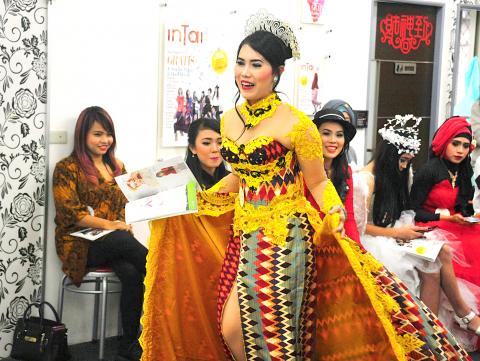Rafael Febriant is in a celebratory mood. Having just made the cover of InTai, an Indonesian-language magazine that appears in most Indonesian shops in Taiwan, the honor will move him one step closer to achieving his dream of fame and fortune.
“I am very happy now that many Indonesian people recognize me in Taiwan,” he says of being a cover model and the accompanying feature story written about his life, interests and aspirations.
Febriant, 21, dreams of becoming a wedding stylist or entertainer, but for now he still works long hours as a welder in a factory in Taichung. Earlier this month, he put on his best clothes, channeled his swagger and beat out more than 100 hopefuls at InTai’s monthly pageant to earn this opportunity, one that many Indonesians in Taiwan probably wouldn’t have in their home country.

Photo: Han Cheung, Taipei Times
“Many of them don’t come from big cities, and come here right after high school to work as domestic helpers,” Intai founder Deyantono says. “They won’t have this chance.”
Febriant is making the most of his victory. Just in the past few weeks, he’s starred in a couple of Internet advertisements for products targeteing the 237,610 Indonesians working in Taiwan — over 40 percent of the nation’s foreign employees — and sang at an event in Taichung.
DRESSED TO KILL

Photo: Han Cheung, Taipei Times
Sitting in chairs on each side of the makeshift “catwalk” in InTai’s small office are contestants dressed in various styles, ranging from the modest hijab and long gown to some pretty outrageous outfits and heavy makeup. One woman is dressed as a Japanese schoolgirl and professes her penchant for the “kawaii” style. Another flaunts a revealing Javanese-style gown with an extra long hem, while yet another is dressed in a white wedding-style costume with a multi-layered white-leaf headdress and angel wings.
Brimming with confidence, Febriant struts down the runway, even volunteering to demonstrate his routine to this reporter before the contest begins. He says he grew up in an environment familiar with modeling, as his father is a photographer and his mother a stylist. Later, he belts out a song on stage during a raffle for face cream and international phone cards.
At the end of the catwalk is a man with a cellphone, toward which the contestants introduce themselves on live broadcast via Facebook. Then they pose for photos while holding the magazine. Some are pretty bold — one contestant drops to the ground and crawls toward the photographer.

Photo: Han Cheung, Taipei Times
A four-person panel of judges, comprised of Deyantono and representatives from partnering businesses, will choose the top 10. The winner is determined by public voting on Facebook.
“If you don’t have a lot of friends, you can’t win,” Deyantono quips.
With nearly 5,000 Facebook friends, Febriant doesn’t have that problem. Neither does runner-up Erwina, who is somewhat of an Internet celebrity with more than 6,000 followers on Facebook. She spends her monthly day off traveling to sites such as Jiufen and Keelung where a friend takes photos of her in different costumes, which she uploads to Facebook to maintain her fan base.

Photo: Han Cheung, Taipei Times
THE BUSINESS SIDE
InTai magazine has featured Indonesians living in Taiwan on its cover since its inception 10 years ago. Deyantono’s competitors have closed down over the years due to the Internet, but he carries on because of a comment a Taiwanese friend made before the magazine started.
“He said that there are publications for other migrant groups but not Indonesians because we aren’t as smart,” he says. “He wasn’t serious, but it really made me sad. So as long as I am not losing money, I will keep doing it.”

Photo: Han Cheung, Taipei Times
However, revenues have been dropping, and Deyantono needed a way to cut costs. Before, they would call for photo submissions, choose one applicant and invite him or her to the studio for a photoshoot and interview.
“We had to hire professional photographers and stylists, and it cost a lot of money and time,” Deyantono says. “Now they come dressed up with their makeup done, and our photographer can just take the photos on the spot.”
However, he did not expect the event to become so popular.
Febriant acknowledges that he probably wouldn’t have this type of “celebrity” opportunity if he returned to Indonesia, but he thinks it’s a step toward his goal of eventually running a wedding business with his family back home.
“At least I’ll have the experience and achievements ... while I prepare the capital to build [my business] in Indonesia,” he says.

In the March 9 edition of the Taipei Times a piece by Ninon Godefroy ran with the headine “The quiet, gentle rhythm of Taiwan.” It started with the line “Taiwan is a small, humble place. There is no Eiffel Tower, no pyramids — no singular attraction that draws the world’s attention.” I laughed out loud at that. This was out of no disrespect for the author or the piece, which made some interesting analogies and good points about how both Din Tai Fung’s and Taiwan Semiconductor Manufacturing Co’s (TSMC, 台積電) meticulous attention to detail and quality are not quite up to

April 21 to April 27 Hsieh Er’s (謝娥) political fortunes were rising fast after she got out of jail and joined the Chinese Nationalist Party (KMT) in December 1945. Not only did she hold key positions in various committees, she was elected the only woman on the Taipei City Council and headed to Nanjing in 1946 as the sole Taiwanese female representative to the National Constituent Assembly. With the support of first lady Soong May-ling (宋美齡), she started the Taipei Women’s Association and Taiwan Provincial Women’s Association, where she

Chinese Nationalist Party (KMT) Chairman Eric Chu (朱立倫) hatched a bold plan to charge forward and seize the initiative when he held a protest in front of the Taipei City Prosecutors’ Office. Though risky, because illegal, its success would help tackle at least six problems facing both himself and the KMT. What he did not see coming was Taipei Mayor Chiang Wan-an (將萬安) tripping him up out of the gate. In spite of Chu being the most consequential and successful KMT chairman since the early 2010s — arguably saving the party from financial ruin and restoring its electoral viability —

It is one of the more remarkable facts of Taiwan history that it was never occupied or claimed by any of the numerous kingdoms of southern China — Han or otherwise — that lay just across the water from it. None of their brilliant ministers ever discovered that Taiwan was a “core interest” of the state whose annexation was “inevitable.” As Paul Kua notes in an excellent monograph laying out how the Portuguese gave Taiwan the name “Formosa,” the first Europeans to express an interest in occupying Taiwan were the Spanish. Tonio Andrade in his seminal work, How Taiwan Became Chinese,